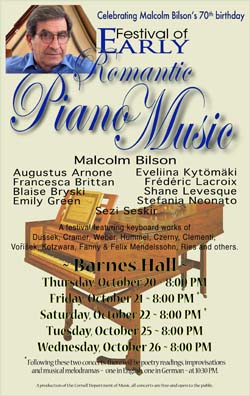Piano concerts and symposium will be music and words to Malcolm Bilson's ears
By Daniel Aloi

Piano works of the early 19th century will fill Barnes Hall next week, and it will be music to Malcolm Bilson's ears.
The Department of Music is celebrating music professor Bilson's 37-year career at Cornell in honor of his 70th birthday on Oct. 24. Among the events are a symposium, "Haydn and Beethoven: Piano Music and Piano Culture in the 1790s," and a series of free concerts in Barnes Hall.
The Festival of Early Romantic Piano Music, to be held over five evenings, Oct. 20-26 (all at 8 p.m.), will feature Bilson and nine of his current students, all musicians in Cornell's performance practice and musicology graduate degree programs. The lineup is reminiscent of a concert tour in 1994 in which Bilson and his then-students played the cycle of the complete Beethoven sonatas.
This time, the focus will be on music by lesser-known but significant composers -- such as Hummel, Czerny, Cramer, Dussek, Ries and Clementi -- performed partly on original period instruments. The works will range from fantasies, variations and sonatas to works for four hands, including "The Battle of Prague" by Franz Kotzwara. All concerts are free and open to the public.
The pianists joining Bilson -- the Frederick J. Whiton Professor of Music -- in concert include Augustus Arnone, Francesca Brittan, Blaise Bryski, Emily Green, Eveliina Kytömäki, Frédéric Lacroix, Shane Levesque, Stefania Neonato and Sezi Seskir.
Two after-concert programs will feature receptions with the musicians, followed by poetry readings, improvisations and musical melodramas -- a program in English on Oct. 21 and in German on Oct. 22.
The first three concerts will be a warm-up for an all-day symposium on Oct. 23 in Lincoln Hall, gathering noted musicologists and other scholars to discuss Viennese music of the 1790s.
The plans to host a symposium went hand-in-hand with Bilson's long-held interest in performance and musicology and with the musical ideas to which he has devoted his career as a scholar, teacher, world-famed concert musician and recording artist.
"It has to do with the character of Malcolm's own work and career as a musician -- and with the relationship between scholarship and performance, a central part of what we do here," said Goldwin Smith Professor of Music James Webster, acting music department chair. "With the D.M.A. degree program in performance and instrumental music, some students have turned out to be not only performers, but scholars on the highest level as well. In light of that, it would be silly not to have a symposium."
Bilson himself will be the focus of the closing panel discussion, "'How to Read Music': Malcolm Bilson and the Significance of Late 18th-Century Musical Notation."
Panel participants will include faculty members, such as Webster and Neal Zaslaw, Bilson's former students and Gretchen Wheelock of the University of Rochester's Eastman School of Music.
"She seemed the ideal outside scholar to have in this symposium," Webster said. "She will be the lead speaker on Malcolm's work and then the others will give brief statements, followed by discussion and a response from Malcolm."
Other symposium presenters will include Tom Beghin of McGill University, a graduate student of Bilson's from 1989 to 1993, who will speak about Haydn's London piano works; Katalin Komlós, professor at the Liszt Academy in Budapest and an expert on 1790s piano music in Vienna, who earned a Ph.D. in musicology at Cornell in 1983; and Elaine Sisman '72, one of Bilson's first students and now president of the American Musicological Society, presenting "Constructing the Sonata Opus."
László Somfai, an important Haydn scholar -- also from the Liszt Academy -- will address the notation of two Haydn sonatas, and Christoph Wolff of Harvard University, a Bach and Mozart scholar, will focus on landmark sonatas by Mozart.
Media Contact
Get Cornell news delivered right to your inbox.
Subscribe